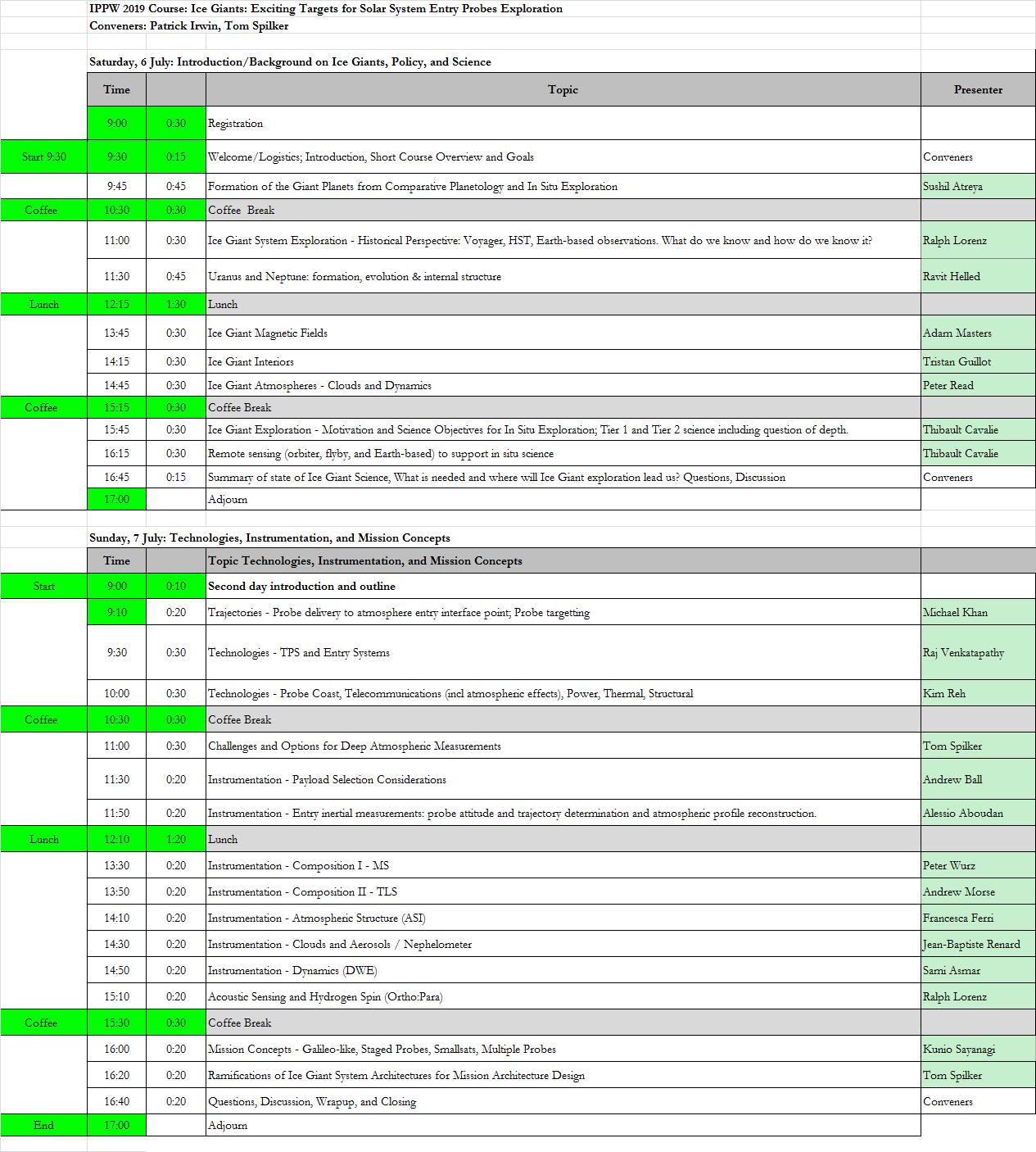Links to presentations will be published as they are made available to the Short Course team.
Links to the Short Course presentations
Day 1
Formation of the Giant Planets – Atreya_IPPW2019_Short Course
Ice Giant System Exploration – Lorenz_IPPW2019_Short Course
Ice Giant Magentic Field – Masters_IPPW2019_Short Course
Ice Giants Atmospheres – Clouds and Dynamics – Read IPPW 2019 Short Course
Ice Giants_InSitu Exploration – TCavalie_IPPW2019_Short Course
Ice_Giants_Remote Sensing – TCavalie_IPPW2019 Short Course
Day 2
Trajectories – Probe Delivery_Probe Targeting – Khan IPPW 2019 Short Course
Technologies – TPS and Entry Systems – Venkatapathy IPPW 2019 Short Course
Technologies – Probe Coast Telecoms Power Thermal Structural – Reh_IPPW 2019 Short Course
Challenges and Options for Deep Atmospheric Measurements – Spilker IPPW 2019 Short Course
Instrumentation – Payload Selections – Ball_IPPW 2019 Short Course
Instrumentation – Composition I – MS – Wurz IPPW 2019 Short Course
Instrumentation – Composition II – TLS – Ferri IPPW 2019 Short Course
Instrumentation – Dynamics (DWE) – Asmar – IPPW 2019 Short Course
Acoustic Sensing and Hydrogen Spin (OrthoPara) – Lorenz – IPPW 2019 Short Course
Ice Giant Systems Architectures for Mission Architectures Design – Spilker IPPW 2019 Short Course
Ice Giants: Exciting Targets for Solar System Entry Probes Exploration
The International Planetary Probe Workshop (IPPW) Short Course will take place on the weekend preceding the IPPW conference, 6-7 July 2019, and will address the topic of in situ exploration of the ice giant planets. The Course will be delivered in the Martin Wood Lecture Theatre, the same location as the Workshop.
Brief Description
Galileo and Cassini performed spectacular in-situ investigations of Jupiter and Saturn, and Juno continues to explore the deep atmosphere of Jupiter. The remaining solar system atmospheres for which in-situ explorations have not been performed are the ice giants, Uranus and Neptune. In addition, the Kepler mission and microlensing surveys have shown that many exoplanets are ice giant-sized. Therefore, Uranus and Neptune are the obvious and most scientifically important next step in giant planet atmosphere exploration. Fundamentally different from the gas giants Jupiter and Saturn, a comprehensive mission that includes an in-situ atmospheric element to study an ice giant offers enormous potential for new discoveries, as well as a valuable context for and an improved understanding of the formation, evolution, and current structure of the solar system and exoplanetary systems.
The 2013-2022 Decadal Survey specifically calls out the ice giants as key targets for future investigations, designating a Uranus orbiter and probe mission as the third-highest priority following MAX-C (which has morphed into Mars 2020) as the initial step of the NASA-ESA Mars Sample Return campaign, and the Europa Project which comprises a Europa Orbiter, possibly followed by a Europa Lander. With Mars 2020 and the Europa mission well underway, it is hoped that the next step will be along the path leading towards a future ice giant mission.
The short course will comprise two days of presentations by experts in the field of solar system formation and evolution, giant planets and planetary atmospheres, in-situ exploration of planetary atmospheres including science and instrumentation, technology requirements, and concepts for ice giant entry probe missions.
On day#1, the science of the ice giants, where the ice giants fit into the spectrum of solar system bodies that include the terrestrial planets and the gas giants, why it is important to explore the ice giants, science goals and objectives, relative benefits of exploring Uranus and Neptune, and the relationship to exoplanet studies will be addressed.
On the second day, the focus will shift to discussions on possible mission architectures, post-release techniques for coast, entry and descent, instrumentation to address the science goals, and ice giant probe technologies, with emphasis on specific challenges facing outer solar system probes, including power, thermal, and telecommunications.
Short Course schedule

Short Course Contact
Dr. Patrick Irwin
patrick.irwin@physics.ox.ac.uk

